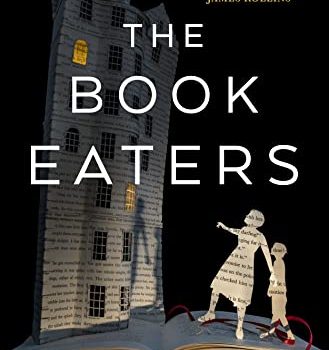Gary K. Wolfe Reviews The Book Eaters by Sunyi Dean
 The Book Eaters, Sunyi Dean (Tor 978-1-25081-018-2, $26.99, 304pp, hc) August 2022.
The Book Eaters, Sunyi Dean (Tor 978-1-25081-018-2, $26.99, 304pp, hc) August 2022.
In my distant youth, one of my favorite poets was Mark Strand, and one of his most widely reprinted poems began, ‘‘Ink runs from the corners of my mouth./There is no happiness like mine./I have been eating poetry.’’ It was a surreal and somewhat whimsical take on the idea of literature as consumer goods, but even at the time I wondered if you could extend that conceit into some sort of a fantasy narrative. Now someone has, and happiness has nothing to do with it. Sunyi Dean’s The Book Eaters shares with a few other recent fantasies (Kelly Barnhill’s When Women Were Dragons is another) a central premise so defiantly absurd, so irreducibly strange, that its causes are barely even addressed, and the author’s self-imposed challenge is to embed it seamlessly into a tale with otherwise more familiar structural elements. In Dean’s case, these elements include escaping from a terrifying and repressive cult, the power of parental love, and a rather gruesome but original variation on the traditional vampire conundrum of finding something good to eat.
Devon Fairweather is a book eater, a member of one of six ancestral families scattered across England whose peculiarity is that they possess extra sets of teeth specifically designed to chew up books, after which they somehow magically retain the contents, even if they haven’t actually read the books beforehand. (One trade-off is that book eaters themselves are incapable of writing and are limited in imagination.) Though they’re clearly not human – they even dissolve into fluttering sheaves of paper when killed – no one knows their origin (although vague rumors of aliens are briefly mentioned). To complicate matters further, some are born as mind-eaters, who satisfy their hunger not by eating books, but by sucking out parts of victims’ brains with their long, tubular tongues – and then absorbing the knowledge, memories, and even the speech habits of those victims, who are left nearly mindless. As the tale opens, Devon is on the run with her son Cai, a mind eater, and has to regularly supply him with victims to satisfy his raging hunger. One of a number of moral dilemmas Dean introduces is that Devon feels she must find basically decent people for Cai to absorb, such as the kindly vicar who gets demolished in the shocking opening chapter.
The rest of the narrative is divided between Devon’s own life story among the Fairweathers, as oppressive and Brontëan a family as you could ask for, in which women are regarded as little more than baby-makers for the survival of the clan, and whose children are taken away shortly after birth to be raised by the fathers. After having been forced to give up a daughter, Devon learns of another family that has developed a drug that can permit mind eaters to lead comparatively normal lives eating books like everyone else. As the two narratives converge, Devon not only realizes the fierceness of her own protectiveness toward Cai, but begins to find the possibility of her first real romance with a skilled woman fighter who helps her escape from ‘‘dragons’’ – adult mind eaters sent to capture Devon and her son after her escape from the family. While The Book Eaters gains considerable power through its themes of parental love and brutal misogyny, and while its contemporary chapters make for a suspenseful and quite satisfactory thriller, the book eating itself seems marginal to the main action, although it occasionally serves specific plot points (like the advantage of eating a train schedule for someone trying to flee). Devon briefly mentions enjoying the taste of George McDonald Fraser’s Flashman novels, and chapter epigraphs offer plenty of clues to Dean’s literary influences (especially George MacDonald’s odd fairytale ‘‘The History of Photogen and Nycteris’’ – more often published as ‘‘The Day Boy and the Night Girl’’), but readers expecting a full-scale bibliofantasy packed with arch literary allusion won’t find much of it here. No one eats Proust and ends up with a craving for madeleines, for example. Still, it’s a gripping tale of hidden supernatural communities battling it out in the shadows, and Devon herself emerges as a complex and conflicted figure negotiating a dark world of daunting moral challenges and toxic misogyny.
Gary K. Wolfe is Emeritus Professor of Humanities at Roosevelt University and a reviewer for Locus magazine since 1991. His reviews have been collected in Soundings (BSFA Award 2006; Hugo nominee), Bearings (Hugo nominee 2011), and Sightings (2011), and his Evaporating Genres: Essays on Fantastic Literature (Wesleyan) received the Locus Award in 2012. Earlier books include The Known and the Unknown: The Iconography of Science Fiction (Eaton Award, 1981), Harlan Ellison: The Edge of Forever (with Ellen Weil, 2002), and David Lindsay (1982). For the Library of America, he edited American Science Fiction: Nine Classic Novels of the 1950s in 2012, with a similar set for the 1960s forthcoming. He has received the Pilgrim Award from the Science Fiction Research Association, the Distinguished Scholarship Award from the International Association for the Fantastic in the Arts, and a Special World Fantasy Award for criticism. His 24-lecture series How Great Science Fiction Works appeared from The Great Courses in 2016. He has received six Hugo nominations, two for his reviews collections and four for The Coode Street Podcast, which he has co-hosted with Jonathan Strahan for more than 300 episodes. He lives in Chicago.
This review and more like it in the July 2022 issue of Locus.
 While you are here, please take a moment to support Locus with a one-time or recurring donation. We rely on reader donations to keep the magazine and site going, and would like to keep the site paywall free, but WE NEED YOUR FINANCIAL SUPPORT to continue quality coverage of the science fiction and fantasy field.
While you are here, please take a moment to support Locus with a one-time or recurring donation. We rely on reader donations to keep the magazine and site going, and would like to keep the site paywall free, but WE NEED YOUR FINANCIAL SUPPORT to continue quality coverage of the science fiction and fantasy field.
©Locus Magazine. Copyrighted material may not be republished without permission of LSFF.







